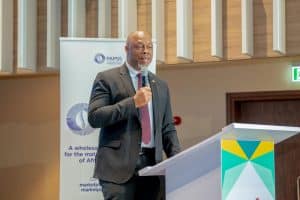
Expanding Digital Opportunities for Youth and Women in AfCFTA: Leveraging Starlink’s Satellite Internet
The problem of inclusivity is a severe discussion in the African Continental Free Trade Agreement (AfCFTA). Without youths and women being included in exploiting opportunities in the great African market, social crimes will likely increase. The lack of a market in Africa limits the opportunities for the youth, and thus they are free to look for opportunities in other places such as Europe, the USA, and Arabic countries. In those places, these Africans are often labeled as illegal migrants or mistreated in their work areas, such as the cases reported in Arabic Countries.
In 2020 and 2021, the number of international migrants in Europe and Asia was approximately 87 million and 86 million, respectively, representing 61% of the global international migrant population. North America followed closely behind, with almost 59 million international migrants accounting for 21% of the global migrant stock. Africa, Latin America, the Caribbean, and Oceania constituted 9%, 5%, and 3% of the global migrant population. The AfCFTA, an agreement signed by African countries to create a single market for goods and services on the continent, can potentially reduce the number of Africans looking for markets. The agreement offers a unique opportunity to promote economic growth and development.
Digitalization in making AfCFTA inclusive
Digitalization has been argued to be a leading driver of economic growth in developing countries. It raises capital and labor productivity, lowers transaction costs, and facilitates access to global markets. New technologies facilitate access to goods and services at lower prices, and developing economies may even be able to leapfrog to developed economic status. For example, mobile phone diffusion in developing countries has made long-distance communications accessible, Mobile banking is another example that has facilitated access to financial services by a majority of poor people due to the lack of banks in rural areas.
The effects of digitalization result from both the supply and demand sides. On the supply side, this involves activities that directly produce information and communications goods and services. Investment in digital technologies is a capital input that, when combined with labor, leads to capital deepening and increased labor productivity in other sectors of the economy. Digitalization contributes to economic growth through human capital development obtained through training, education, and better health care. These effects have positive externalities that contribute to overall economic growth. In low-income countries, the effects of digitalization on economic growth and productivity may take longer because there is not enough competitive space, and the government controls the markets. In developed countries, markets are free with less government control.
The use of digital technologies contributes to economic growth. Generally, one of the channels through which growth is affected by the use of digital technologies is through the way ICT reshapes ways of transacting via electronic commerce and online business, facilitating flexibility in banking operations and improved communications that finally foster productivity and economic growth.
The digital divide: Let Starlink make people connected
The digital divide is the gap between those with access to digital technologies and those without, affecting education, politics, health, and job opportunities. It leads to social stratification, separating those who are not connected, those who use the internet inefficiently, and those who use it excessively. Developing countries face challenges in distance education due to poor internet connections, hindering economic development. Digital technologies offer economic benefits and a higher quality of life, but poverty and digital divide problems can create a poverty trap. The digital divide creates social and economic exclusion, impacting individuals and society. In today’s world, the Internet is necessary for business activities, and lack of access can further disadvantage those in markets relying on digital platforms. Bridging the digital divide requires investment in infrastructure and access to digital technologies for all citizens, promoting economic development and social inclusion.
“The digital divide creates social and economic exclusion, impacting individuals and society.”
Starlink, a satellite internet provider by SpaceX, has launched in Nigeria and Mozambique, making them the first African countries to allow its operation. Satellite internet services like Starlink offer a viable solution for bridging the connectivity gap in rural areas with limited traditional infrastructure and fuel growth in areas such as education, governance, disaster mitigation, health, and agriculture. This presents an opportunity to enhance e-opportunities in the African Continental Free Trade Area (AfCFTA). Despite concerns about affordability, Starlink can potentially drive growth in various sectors, including education, governance, disaster mitigation, health, and agriculture. Starlink’s satellites could also be utilized for remote sensing and Earth observations, benefiting crop monitoring and water resource management. Starlink is now available in Nigeria and Rwanda and will expand to other parts of Africa in 2023 and 2024.
The affordability challenge can be alleviated by allowing competitors offering similar services to operate in Africa. The companies offering similar services are OneWeb, HughesNet, Viasat, and Amazon’s Project Kuiper. This is a call to African countries to remove the bureaucratic processes in registering businesses, which delay the opportunities to get people connected to exploit the available opportunities. For example, in Tanzania, the Minister of Information, Communication, and Information Technology, Nape Nnauye, has stated that Starlink needs to establish a physical office in Tanzania and share its data protection plan before receiving operational approvals. This excuse to delay the approval is invalid as Tanzania’s tax laws now recognize electronic services companies without a physical presence, allowing them to register and pay taxes.
That is, even other countries should establish a digital tax, which makes companies and businesses pay taxes without having a physical address in the specific country. The absence of the physical office should not hinder the digital services which require no physical office. It has to be known that digital infrastructures are needed to make AfCFTA inclusive, and thus, African countries have to embrace their establishments.
These are the writer’s own opinions and do not necessarily reflect the viewpoints of Liberty Sparks. Do you want to publish in this space? Contact our editors at [email protected] for further clarification.



